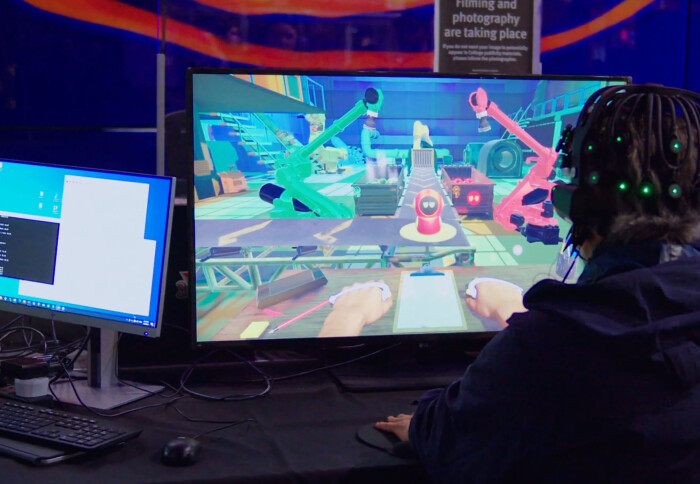Cogitat partnered with NHS to bring its neurotechnology to stroke patients

Brain-computer interface startup Cogitat has begun early clinical research into the use of its technology to aid stroke rehabilitation.
The Imperial startup is developing a brain-computer interface that allows users to control computer software such as games in virtual reality or on an ordinary screen using just the power of thought. The technology works using a non-invasive EEG headset to read electrical activity in the brain that is correlated with motor intentions, and advanced AI algorithms that decode it.
The virtual hand could guide the patients to perform the mental actions required to retrain the required neural pathways.
As reported previously, the company has been working with production studio UNIT9 to explore not only entertainment applications of the technology but also its potential to be used as a medical technology to aid upper limb rehabilitation in stroke patients.
The rehabilitation games they are developing feature a virtual hand that responds not only to actual hand movements, but also to hand movements that users have merely mentally willed. Stroke patients often find that their intended movements, reflected in brain commands that can be detected by Cogitat’s technology, fail to translate into actual movements due to loss of brain function induced by the stroke.
By responding to these intended movements, the virtual hand could guide the patients to perform the mental actions required to retrain the required neural pathways, and provide additional motivation by gamifying the activity, with potential to include a social element as game players interact online, providing motivational benefits similar to a group exercise class.
Cogitat and UNIT9 are now beginning early research supported by a grant of £500,000 from Innovate UK to take the concept into the clinic and are developing it in partnership with clinicians at University College London Hospital led by Dr Robert Simister, clinical lead for stroke at University College London Hospitals NHS Foundation Trust.
Technology demoed
Visitors to an Imperial Lates event were given the chance to try the company's brain-computer interface technology for themselves earlier this year. You can see their responses in this video courtesy of Cogitat.
Bringing brain-computer interfaces to the clinic
Dr Simister says that the tool will enable a useful new model of therapy. "A hybrid model of therapy will be possible with Cogitat. A single therapist will work more efficiently by combining face-to-face review with remote observation and feedback via Cogitat’s gaming. Users engaging with the system will feel encouraged to participate in therapy more frequently and for longer periods. Overall, the ‘dose’ of therapy received will increase and lead to better recovery.”
A hybrid model of therapy will be possible with Cogitat. A single therapist will work more efficiently by combining face-to-face review with remote observation and feedback via Cogitat’s gaming. Users engaging with the system will feel encouraged to participate in therapy more frequently and for longer periods. Dr Robert Simister
The research project will help the team move into the next stage of research and development by measuring the brainwaves of 20 stroke patients, gathering data that will be used to optimise Cogitat’s brain-computer interface and UNIT9’s telerehabilitation platform. The research will also allow Cogitat and UNIT9 to gain insights from clinicians and patients about the exercises that are most beneficial. They plan to trial a protype product with NHS patients in 2024.
UNIT9 is lending its expertise into making products that are entertaining. “We at UNIT9 bring forth our expertise in crafting immersive interactive experiences that transcend mere entertainment. With a profound understanding of the persistent challenge surrounding patient retention during repetitive exercises, we recognise the criticality of fostering plasticity and movement. Our primary goal is to infuse a sense of enjoyment into these activities, redefining the concept of fun and ensuring a captivating experience for every participant,” said Valerio Rossi, Digital Innovation and R&D Manager at UNIT9.
Dr Allan Ponniah, co-founder and CEO of Cogitat and a consultant with Royal Free NHS Foundation Trust said, “Innovate UK’s grant is vital to the next stage of our development as we believe our neurotechnology can be a valuable tool for the under-resourced stroke rehabilitation market.”
Cogitat is based on research by its co-founders Professor Stefanos Zafeirou and Dr Dimitrios Adamos in Imperial’s Department of Computing.
Article supporters
Article text (excluding photos or graphics) © Imperial College London.
Photos and graphics subject to third party copyright used with permission or © Imperial College London.
Reporter
David Silverman
Communications Division
